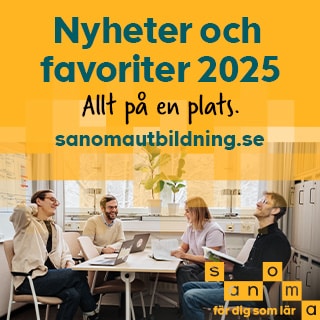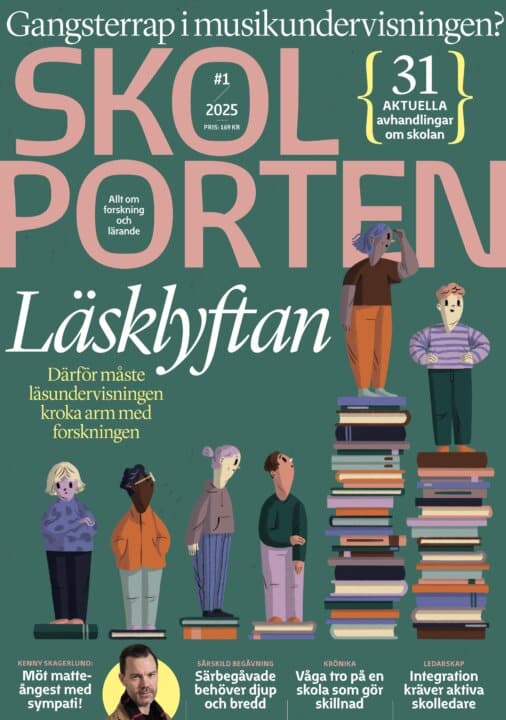Utbildning för hållbar utveckling från en lärarhorisont. Sammanhang, kompetenser och samarbete
Utbildning för hållbar utveckling har potential att erbjuda utrymme för komplexa frågeställningar, menar Ingela Bursjöö.
Ingela Bursjöö
Göteborgs universitet
2014-10-17
Utbildning för hållbar utveckling från en lärarhorisont. Sammanhang, kompetenser och samarbete
Education for Sustainable Development in science education: coherence, competences and collaboration
Institutionen för fysik
Utbildning för hållbar utveckling från en lärarhorisont. Sammanhang, kompetenser och samarbete
En sammanläggningsavhandling som bygger på lärares reflektioner om sin undervisningspraktik relaterad till hållbar utveckling. Ett särskilt intresse riktas mot grundskolans undervisning i naturvetenskapliga ämnen och avhandlingen visar exempel på hur lärare hanterar ett undervisningsinnehåll som beskrivs som komplext och utan givna svar. Avhandlingen följer en hermeneutisk tradition genom att tolka skeenden från olika förståelsehorisonter, och det är lärarens röst som framhålls i denna studie. Orsakerna till det valda lärarperspektivet är flera, dels har läraren i omfattande forskningsöversikter visat sig vara den enskilt viktigaste faktorn som påverkar elevers lärande, dels har avhandlingen ambitionen att vara praktiknära och bidra till skolans kunskapsutveckling. Forskningsfrågorna har vuxit fram i och ur en undervisningspraktik och studien är genomförd av en lärare i naturvetenskap som parallellt med verksamheten i skolan genomgått en forskarutbildning.
Avhandlingens analytiska redskap hämtas från olika betraktelsesätt av lärares professionella utveckling och transformativa processer för att förstå de förändringar som lärarna erfar. Med insamlade data som sträcker sig över sju år kan olika förändringsprocesser identifieras och mönster urskiljas som beskrivs i termer av förändringsvägar, kompetenser och lärares handlingsutrymme. Bland annat visar studien att de utmaningar och dilemman som lärare erfar i sin undervisningspraktik är knutna till diskussioner om ämnesövergripande samarbete och lärares etiska kompetens. Lärarna framhåller dessa områden som viktiga, men också som en bristvara i deras undervisningspraktik relaterad till hållbar utveckling. Lärarna beskriver kvalificerade förmågor som de ser som önskvärda att deras elever skall utveckla, även förmågor som sträcker sig bortom läroplanens krav. Samtidigt som studien pågår sker ett flertal stora förändringar i det svenska skolsystemet; ny läroplan, ny skollag, nya betygskriterier, ny lärarutbildning, lärarlegitimation, storskaliga kunskapsmätningar, för att nämna några. Dessa förändringar påverkar hur lärarna talar om sin undervisningspraktik relaterad till hållbar utveckling. Lärarna beskriver att de är kringskurna i sina ambitioner att bedriva god undervisning då de ofta måste prioritera hårt när tid är en bristvara. Stödjande strukturer i form av kvalificerad kompetensutveckling och en god samarbetskultur visar sig då vara avgörande. Utbildning för hållbar utveckling har potential att erbjuda utrymme för komplexa frågeställningar när uppdraget förvaltas av väl förberedda lärare i en väl fungerande organisation. Resultaten från denna forskning ger inte minst därför värdefull kunskap till både forskare, yrkesverksamma lärare, skolledare, lärarstudenter, lärarutbildare och skolpolitiker om vad utbildning för hållbar utveckling kan innebära för undervisningspraktiken.
Education for Sustainable Development in science education: coherence, competences and collaboration
Education for sustainable development, ESD, seeks to elucidate complex problems and interdisciplinary, holistic and transformative teaching and learning are described as possible approaches. All teachers, regardless of what subject they teach or where they are in their careers, must face dilemmas related to educational practice, including sustainability issues. However, ESD is found to be unsatisfyingly implemented in the Swedish educational system and in teacher education. This gap between the teaching practice, policy documents and research could depend on several factors, including valued outcomes, curriculum, school management, teacher competences and (lack of) professional development.
The aim of this thesis is to understand how teachers handle the assignment to educate for sustainable development. In the hermeneutic interpretation of data, from open-ended questionnaires, interviews and participating observations, three different analytical tools are used: a model of transformative processes, an interconnected model of continuing professional growth and the idea of professional capital. The teachers in the study have high ambitions for the outcomes of their teaching related to ESD; they describe student capabilities of higher order thinking as critical ability, analytical and communicative abilities and a thorough understanding of scientific concepts. Some of the described capabilities even go beyond the curriculum, as empathy, courage and rebellious actions. The competencies related to ESD have a considerable ethical dimension, both related to the students, the ESD content and to the teachers themselves. When teachers collaborate with colleagues their different competencies could complement each other. However, the teachers describe how their possibilities to plan and perform interdisciplinary collaboration have decreased. The teachers also describe an increase in the complexity of their profession. As a result of the analysis of longitudinal data four different trajectories are constructed and elaborated. These pathways describe changes in teachers’ reflections on teaching sustainability issues. The ecological pathway emphasizes the environmental aspects. The holistic pathway emphasizes changes of society and education. The curriculum-based pathway emphasizes writings in policy documents, as the curriculum. The fourth pathway is fundamentally different from the three others; expressing signs of a disillusion, and even talking about leaving the teaching profession. The thesis illustrates how science education is loaded with subject knowledge as well as values. To work productively with ESD requires several competences beside science, as philosophy and ethics, which the teachers in the study regard as lacking in their training. Therefore teacher education is of particular interest to support teachers to deal with a changing society. So is teacher professional development, as it is impossible to include all future challenges within the limited period of time that is available for teacher education. One important conclusion is that the external influences on teachers are found to increase during these seven years, whereas opportunities for informed decisions, passion and creativity, vital parts of teachers’ professional capital, are found to decrease.
Professional development need to be more informed by research and consider the collective capacity of teachers. Particularly, research from areas as scientific literacy, socio-scientific issues and ethics in science education could contribute to frame sustainability issues. Since individual teachers are the bridge between science, curricula and educational practice an extensive toolbox is essential. The analysis of data from the present study implies that ESD challenges the whole educational system.
Relaterade länkar

Yrkesutbildning för vuxna
 Vux
Vux
När leken inte fungerar
 Fsk
Fsk








